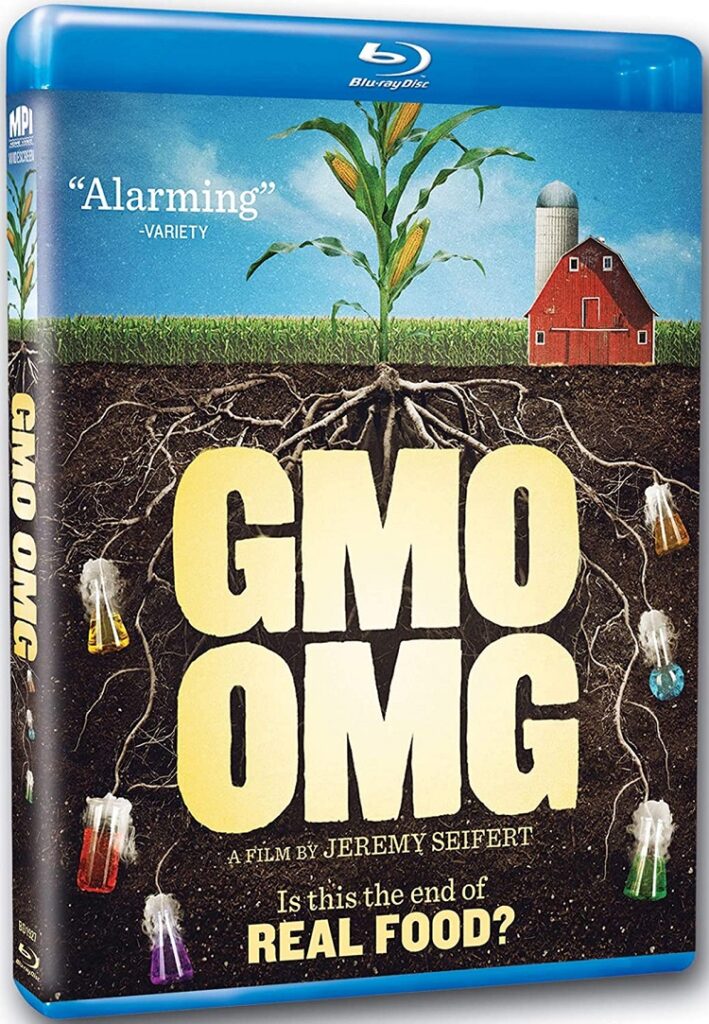
Jeremy Seifert is your every-man American. Wife, kids, and concerned about the well being of his family. He tries to help them all make healthy eating choices, going so far as to grow their own food whenever possible. One of his sons has taken a particular interest in planting and harvesting seeds. When talk of GMOs (genetically modified organisms) started coming up and that they appeared to have made their way into the food supply, he decided to take a closer look. The results of this investigation are chronicled in Seifert’s documentary GMO OMG.
Genetically modified seeds have grown in popularity for their resilience to insects and weed killers, designed to produce high yield. However, the primary issue here is that the long-term effects of ingesting modified foods have not been determined, no one is regulating their use in commonly available products, said products are not being labeled so that consumers can make informed decisions, and the producers of the seeds are making a fortune off the ignorance of the average consumer.
The first synopsis I read of GMO OMG made it sound like Seifert set out with the sole objective of demonizing GMO products. The fact is that he gave Monsanto — the world leader in GMO seed and food products — multiple chances to explain why their products were good and safe, and they went beyond ignoring him — they flat-out told him to leave and had him escorted out of their building immediately, assuming the editing of this section is honest.
Seifert started traveling the world, talking to farmers, scientists, consumers, politicians, and even visiting the Svalbard Global Seed Vault to establish the significance of keeping natural seeds available. It’s not just that one farmer growing GMO corn or soybeans is bad. It’s that his neighbors and anyone else downstream or downwind of the GMO farmer is potentially at risk for having their crops cross-pollinated and mutated into GMOs themselves. Seifert looks at what the happens to the long-term yield of these products and wonders if it’s worth what we may lose in the process. Weakened soil can’t be as productive in future years, something that established organic crop rotation techniques have been adapted to remedy. The GMO yield diminishes over time, or in some cases like with the Monsanto “relief” package to Haiti after the massive earthquake there, the seeds can only be planted once and that land may never be used again. The Haitians protested loud and clear that Monsanto’s brand of “help” was unwelcome and unwanted.
From there, the film explores the debatable patenting of bioengineered organisms. Should people be allowed to own life, particularly something that, until recently, was occurring naturally? Such patents have gone through so far without much fuss, aided by the fact that those set to benefit from them are well invested in Congress, not just financially, but by planting (pun intended) their cronies among the lawmakers and committees designed to monitor and research the effects of these products. Not surprisingly, nothing particular useful has come of this on either side.
One researcher in France, where — along with most of Europe, Russia, China, India, South America, and other parts of the world — GMO seeds and food are either banned or require warning labels on packaging, has surpassed Monsanto’s own limited and potentially extremely biased internal research. Monsanto found no harm done in lab rats exposed to GMOs for a period of three months. Their research data is still being hidden from the public and others in the scientific community. The Frenchman ran a study for two years exposing rats to GMO products. As early as four or five months in — conveniently outside of where Monsanto cut off their own research — the rats started showing signs of tumors developing. By 24 months, the average GMO-fed rat had at least two or three tumors running strong, compared to zero in all the control rats being fed an organic diet.
I don’t want to spoil everything — there’s a lot of great information here, and it’s well worth watching for all of the 80+ minutes it runs. Seifert asks some tough questions of everyone, including his family, all in the name of seeking the truth about GMOs. While we still don’t know what the long-term impact of these products is, there are many opposed to them, and one has to wonder, seriously, if seemingly the entire rest of the world is against these products, why is the USA doing nothing about them? Even labeling efforts at the state level have been met with stiff resistance. Couple with that the fact that 80% of processed foods (many labeled “All Natural”) in stores today contain GMOs (even at Whole Foods), and you really have to wonder whether eating food engineered to act as a pesticide itself really bears no further scrutiny before you chew it up and swallow it.